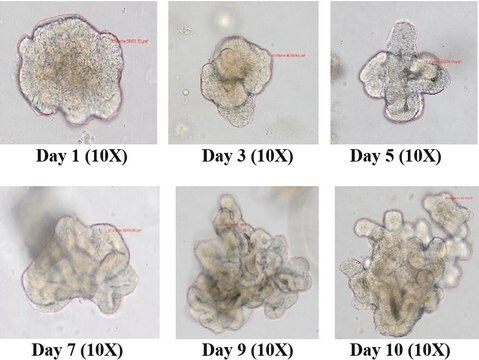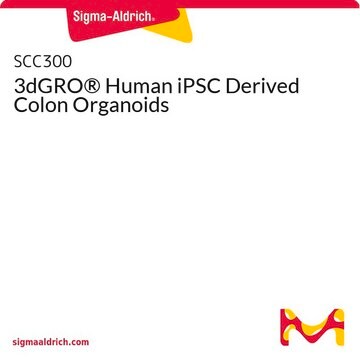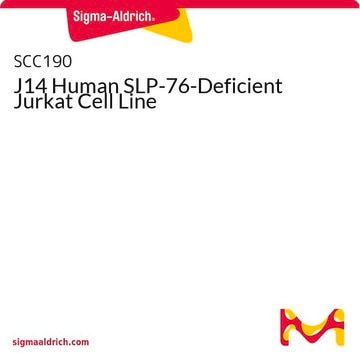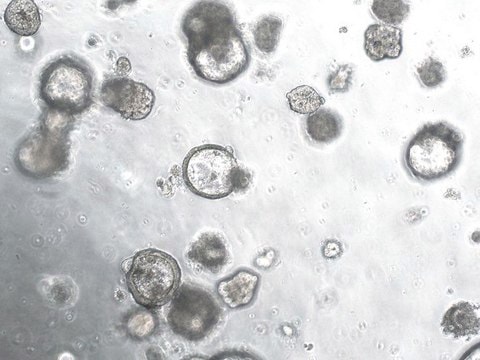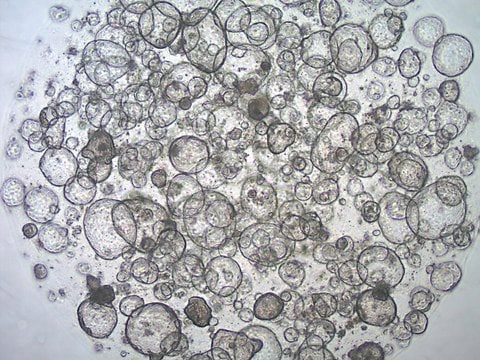SCC310
3dGRO® Colon Intestinal Organoids, Age 46 (14-881-CR)
Cryopreserved patient derived gastrointestinal organoids (PDOs)
About This Item
Productos recomendados
technique(s)
cell culture | stem cell: suitable
General description
We are now offering a comprehensive biobank of highly characterized tissue-derived human gastrointestinal organoids from normal and diseased patients. The intestinal organoid biobank contains over 50 highly characterized intestinal organoids from both normal and diseased patients derived from multiple regions of the digestive systems including small intestine (duodenum, ileum), stomach, rectum and colon.
Cell Line Characteristics
- Sex: Male
- Age: 46 Years
- Organ: Colon (Rectum)
- Disease: Adenocarcinoma (TP53 Pro151Ser, KRAS Gly12Asp, APC Pro1443fs)
Cell Line Origin
Packaging
Storage and Stability
Legal Information
Disclaimer
Storage Class
10 - Combustible liquids
wgk_germany
WGK 3
flash_point_f
Not applicable
flash_point_c
Not applicable
Certificados de análisis (COA)
Busque Certificados de análisis (COA) introduciendo el número de lote del producto. Los números de lote se encuentran en la etiqueta del producto después de las palabras «Lot» o «Batch»
¿Ya tiene este producto?
Encuentre la documentación para los productos que ha comprado recientemente en la Biblioteca de documentos.
Artículos
Organoid culture FAQs. Learn how to culture and analyze organoids following established 3D cell culture protocols. Tips and tricks.
Organoid culture FAQs. Learn how to culture and analyze organoids following established 3D cell culture protocols. Tips and tricks.
Organoid culture FAQs. Learn how to culture and analyze organoids following established 3D cell culture protocols. Tips and tricks.
Organoid culture FAQs. Learn how to culture and analyze organoids following established 3D cell culture protocols. Tips and tricks.
Protocolos
Learn how to cultivate similar-sized iPSC-derived colon organoids using Millicell® Microwell plates and perform a forskolin-induced swelling assay.
Learn how to cultivate similar-sized iPSC-derived colon organoids using Millicell® Microwell plates and perform a forskolin-induced swelling assay.
Learn how to cultivate similar-sized iPSC-derived colon organoids using Millicell® Microwell plates and perform a forskolin-induced swelling assay.
Learn how to cultivate similar-sized iPSC-derived colon organoids using Millicell® Microwell plates and perform a forskolin-induced swelling assay.
Contenido relacionado
Explore our portfolio of 3D cell culture tools and technologies for any 3D cell line or application and discover organoids, hydrogels, ULA, microwell, or hydrogel plates, and more.
Explore our portfolio of 3D cell culture tools and technologies for any 3D cell line or application and discover organoids, hydrogels, ULA, microwell, or hydrogel plates, and more.
Nuestro equipo de científicos tiene experiencia en todas las áreas de investigación: Ciencias de la vida, Ciencia de los materiales, Síntesis química, Cromatografía, Analítica y muchas otras.
Póngase en contacto con el Servicio técnico